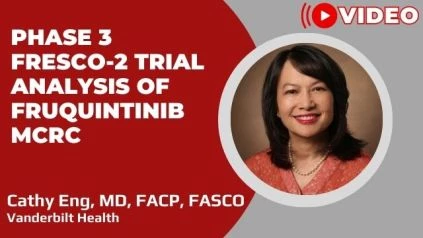The phase 3 FRESCO-2 study evaluated the efficacy and safety of fruquintinib, a novel targeted therapy, in patients with advanced colorectal cancer.
As part of the study, an analysis was conducted to assess the adverse events of special interest associated with fruquintinib treatment. Cathy Eng, MD, FACP, FASCO, from Vanderbilt Health, played a pivotal role in this analysis.
The findings of the study provide valuable insights into the safety profile of fruquintinib and its potential as a treatment option for patients with advanced colorectal cancer.
The FRESCO-2 study enrolled a large cohort of patients with advanced colorectal cancer who had previously received at least two lines of standard systemic chemotherapy.
Participants were randomized to receive either fruquintinib or placebo in combination with the best supportive care.
The primary endpoint of the study was overall survival.
Dr. Cathy Eng and her team focused on the adverse events of special interest that occurred during the study. These events included hypertension, hand-foot syndrome, proteinuria, and diarrhea, which are known side effects associated with fruquintinib treatment.
The analysis aimed to evaluate the incidence and severity of these adverse events and their impact on patients’ quality of life.
The results of the analysis revealed that patients receiving fruquintinib experienced a higher incidence of hypertension, hand-foot syndrome, and proteinuria compared to those on placebo.
However, these adverse events were generally manageable with appropriate interventions, such as dose modifications or supportive care measures.
Additionally, the incidence of severe cases requiring treatment discontinuation was relatively low.
Furthermore, the analysis showed that fruquintinib treatment was associated with an increased incidence of diarrhea.
However, most cases were mild to moderate in severity and could be effectively managed with anti-diarrheal medications.
Dr. Cathy Eng’s contribution to the analysis of adverse events in the FRESCO-2 study is significant, as it enhances our understanding of the safety profile of fruquintinib.
By identifying the adverse events of special interest and providing insights into their management, this analysis contributes to the optimization of fruquintinib treatment in clinical practice.
These findings have important clinical implications for oncologists and healthcare providers involved in the management of patients with advanced colorectal cancer.
The data highlight the importance of proactive monitoring and early intervention for the identified adverse events to ensure the best possible outcomes for patients receiving fruquintinib therapy.
In conclusion, the analysis of fruquintinib adverse events of special interest from the phase 3 FRESCO-2 study, with the notable contribution of Dr. Cathy Eng from Vanderbilt Health, provides valuable information on the safety profile and management strategies for fruquintinib treatment in advanced colorectal cancer patients.
These findings pave the way for further research and potential improvements in patient care for this challenging disease.

